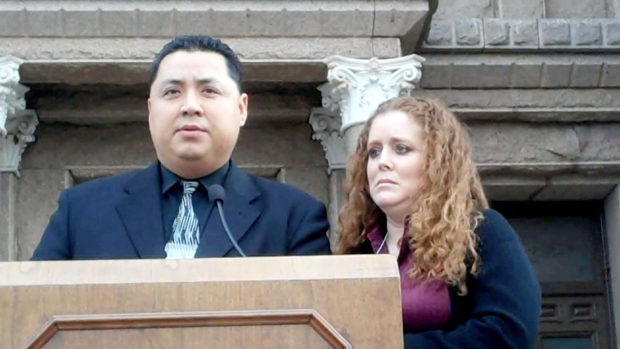
PARENTAL RESPONSE | David and Amy Truong, the parents of 13-year-old gay suicide victim Asher Brown, became tireless advocates for anti-bullying legislation this year. (David Taffet/Dallas Voice)
No. 4
In the fall of 2010, a number of high-profile suicides brought attention to the problem of bullying in schools. This year, the LGBT community worked to change laws and save lives.
After helping to push through policies in the Dallas and Fort Worth school districts, as well as a few others around the state, the LGBT community focused on passing statewide anti-bullying legislation in the 2011 session of the Legislature.
Equality Texas made the legislation a priority and a number of bills were introduced.
In February, Equality Texas hosted a Lobby Day. Several hundred people from around the state participated.
Among them were Fort Worth City Councilman Joel Burns, suicide victim Asher Brown’s parents — Amy and David Truong — and a group of 10 students from Youth First Texas.
Burns and the Truongs met with key legislators including members of the committees that would hear the bills.
The students from YFT spoke to their senators and representatives telling their own stories of being bullied.
Legislators not usually considered allies were visibly moved by stories of violence in schools in their hometowns.
Equality Texas board chair Anne Wynn, Executive Director Dennis Coleman and Deputy Director Chuck Smith spent the spring lobbying on behalf of the bills.
The organization arranged for the Truongs as well as the parents of Montana Lance and Jon Carmichael, two other Texas suicide victims, to testify at committee hearings.
As originally crafted, the bills specified categories that would be covered. National studies have shown that the more specific the law, the more effective it is in protecting LGBT students. When sexual orientation and gender identity are not specified, school staff often ignore anti-gay bullying. But to increase the chances that anti-bullying legislation would pass, several bills were combined and all references to specific groups, including sexual orientation and gender identity, were deleted.
The new anti-bullying “super bill” passed unanimously in the Senate and by a wide margin in the House — and was eventually signed by Republican Gov. Rick Perry.
Under the new law, for the first time, the bully rather than the victim can be transferred to another classroom or school. Parental notification rules were strengthened and protections added for the person reporting the bullying. The definition of bullying now includes electronic means, or cyberbullying. And every school district must adopt an anti-bullying policy, including any necessary procedures to address the prevention, investigation and reporting of incidents.
A second bill also passed that provides money for counseling services, which includes services for both the bully and the victim. School staff already receive training to recognize potential suicide risks. That training will be expanded to include victims of bullying.
Meanwhile, although the Dallas Independent School District approved an LGBT-inclusive anti-bullying policy last year, Resource Center Dallas and Lambda Legal accused some DISD officials of blocking its implementation.
RCD Executive Director and CEO Cece Cox along with Lambda Legal community educator Omar Narvaez addressed the DISD board about the problem in December.
Cox said she had gotten word from frustrated school district employees that principals were being instructed not to use the electronic reporting system that the board mandated. She said she would continue to track the district’s compliance with the policy in 2012.
— David Taffet
This article appeared in the Dallas Voice print edition December 30, 2011.















